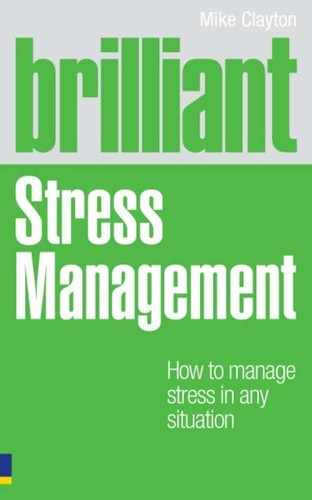100 brilliant stress management
to connect with her, and she nds it hard to talk about anything
but ‘issues that matter’.
But who says she can’t be playful as well?
Feel guilty
Isaac wants to do the right thing, but gets things wrong some-
times. He apologises profusely, but carries the memory for
hours, days or even weeks sometimes, building up a bank of
guilt for all of the inevitable accidents, mistakes and unintended
discourtesies that we all commit.
If you are like Isaac, then you know that you will make mis-
takes. Acknowledge them, learn from them and, in the words of
American folk wisdom:
‘’Fess up – say sorry – move on.’
Know what you want
Your most fundamental attitude is to know what you want. It
links your values to who you are. Values are hard to dene, but at
their simplest they are the criteria that lead you to the decisions
that you want to make. They are an expression of the models of
the world that you hold most dear, and so dene what is really
important to you.
Your values
When your values conict with the values of the people around
you and their expectations of you, you want to rebel. Where you
feel unable to do so – because you feel tied into a relationship or
you feel you cannot afford to lose the job you hold, for example –
then that conict will cause stress. To relieve the stress, you must
either change your values or change your situation.
We looked at changing your situation in Chapter 3, so let’s now
look at changing your values. Nobody has a right to expect you

Control your attitudes 101
to change your values; neither your employer nor your spouse,
nor anyone else. The only person who does have that right is
you.
Yet, few of us even consider either what our values are or, less,
how we might change them. Most have come to us by absorption
from our environment – particularly in our childhoods and early
adulthood. Socrates said that ‘the unexamined life is not worth
living’. Philosophers may argue about what exactly he meant by
this: characteristically, it has many interpretations from ‘I would
rather die than give up philosophy’ to ‘If I don’t appreciate my life, it
has no value.’ One reading is that the only life worth living is one
where we set our own rules.
brilliant
exercise
Understanding and renewing your values
1 Pick the context in which you want to examine your values,
for example, your values around your work and career, or your
home and family life, or money, or health and fitness. Write this
area of your life at the top of a page of notepaper.
2 Below this, write ‘My values in this part of my life are:’ then
list your values. To help you find your values, consider these
questions:
‘What’s important to me about . . . ?’
‘If I had everything I want, what would cause me to give it
all up?’
‘If that happened, what would cause me to keep
everything?’
3 Rank your values to establish an order of priority and number
your values 1, 2, 3 . . . To help you, consider these questions:
‘Of these values, which is the most important to me?’

102 brilliant stress management
You will be at your happiest when your values and your purpose
in life support one another. Once again, however, too many of
us commit our lives to what is expected of us, and not what we
want.
Your life project
Human beings, unlike much of the animal kingdom, are moti-
vated by so much more than opportunistic striving to survive:
we feel a deep need to express who we are. As we grow up, we
do this in different ways, eventually settling on our goals in life,
‘Of the other values, which is the most important to me?’
‘Why is this important to me?’
4 Review your list and ask yourself where each value comes from,
and whether it is still a value you would like to have in your
life. To help you, consider these questions:
‘Did I choose this value, or did I get it from my parents,
friends, teachers, colleagues . . . ?’
‘How much do I want this value to drive my choices in life?’
‘What choices would be open to me if I changed this value?’
5 Give yourself permission to start to make any changes that you
want.
For each value that you want to retain, think: ‘This value
has served me well, and will continue to serve me well. I
honour it.’
For each value that you want to change, think: ‘This value
has served me well in the past, but I have changed. This is
no longer a value I wish to direct my life, and I set it aside.’
For each new value that you wish to adopt, think: ‘This new
value is one I freely choose. I will hold it for as long as it
serves me well.’
..................Content has been hidden....................
You can't read the all page of ebook, please click here login for view all page.
